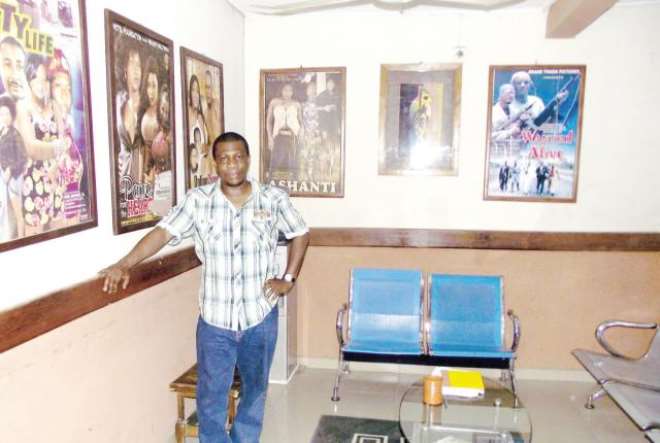Bad actors allege sexual harrassment –Chico Ejiro
Grand Touch Pictures reception Chico Ejiro, brain behind several movie blockbusters and TV soaps, is one of the leading film personalities to have stepped out of Nigeria. Ejiro is renowned for his role in launching the careers of some of Nollywood's biggest stars and has since been dubbed 'Mr. Prolific' for his swiftness in directing movies. In this interview with NGOZI EMEDOLIBE, the member of the famous movie-making family reflects on life as a Nigerian filmmaker. He also gives us a tour of his office. EXCERPTS:
People often describe you as 'that boy who came to assist his brother, Zeb Ejiro on movie locations and ended up becoming a big name'. What's missing in this account of your beginning?
It depends on which one you know. Really, I started my entertainment career with my elder brother, Zeb Ejiro. I was helping him on locations as a camera boy and as a production assistant. But as a child, I remember my mother used to take us to theatres to watch movies. Perhaps that was where I developed the interest. I started out when I was in school.
You were working with Zeb before you left the tertiary institution?
Yes. I worked under him at locations for some of the big productions on NTA. I am talking about Mega Fortunes, Ripples and others. I also worked under Opa Williams, Fred Amata, Andy Amenechi and Mathias Obiahiagbon.
You said your mum influenced your love for the arts by taking you to cinemas, what movies shaped your decision?
I was crazy about 'The Good, The Bad, The Ugly' which featured Clint Eastwood and 'Jesus Christ of Nazareth'. I also used to watch a lot of those horror movies. I just loved entertainment.
At what point did you tell yourself that was the way to go?
I would not say at exactly what point this happened, but it must be after I finished my Youth Service (NYSC). When I was in school, I was doing it on part time basis and never really gave it deep thought. You know I was just flowing with the people around me who happened to be into film and TV production. But in 1990 after NYSC, I started full time. After I worked on 'Mega Fortunes', I started working with Opa Williams. My first movie is a Yoruba film which featured Jide Kososko, Iya Rainbow, and Lola Alao among many others. I also produced a lot of popular movies like Onome with Opa Williams before Mike Nliam and I teamed up to form Grand Touch Pictures.
Is Grand Touch Pictures jointly owned?
That was at the onset. At a point Mike Nliam left.
Over a quarrel?
No, he just felt it was time to do his own thing. You know a time comes in the life of a man when he feels that is the best thing to do.
You studied Agriculture in the university. How much of that have you applied in movie making?
Education is good. It has helped in a lot of ways. It has helped my decision as a director and producer. In this case, what discipline it is does not matter. Yes, I studied Agriculture but found myself in the movies just like so many other professionals in different fields. The key thing is being educated. So many people in the industry studied Engineering and the likes and they are doing great. It is knowledge and it has given me the platform I need to launch my career.
Some people in Agriculture may feel they are not getting enough of your works especially in terms of documentaries?
When I was working on NTA productions, I tried to write a couple of documentaries for 'Food Basket', but it never materialised. But that area can still be explored I have not foreclosed that aspect.
It seems Nollywood is in dire straits at the moment. What went wrong?
It is not as bad as people paint it. However, things are not moving as expected which makes me think it is going through a phase. The industry got it wrong from the lack of structure. We seemed to be building on a sandy foundation and the effect is what we are seeing at the moment. But there are efforts to set up a structure now.
What will the structure address?
From distribution framework to government policy to funding to professionalism, these are some of the areas that should be addressed. Some people have been working to change the situation. Some of the films that have been released lately can bear testimony to this. You can see what Kunle Afolayan is doing with 'The Figurine' and what 'Ije' is doing too. It is just a phase and at the end of the day, the industry will come out stronger. I will also commend Mahmod Ali Balogun and Emem Isong.
But so many bad productions are still circulating?
Yes, but that is how it is in other industries too. In Journalism, there are many bad newspapers and magazines. You cannot stop people from making bad movies, no matter how you try. But we are getting to the stage where those making bad films would run themselves out of the market.
If you get the opportunity to make one change that would turn the industry around, what would it be?
Distribution. That is the major problem. I will set up a structure that will ensure returns for all stakeholders. If you google the movie 'Avatar', you will instantly see how much it has made. We lack such statistics here because the distribution network is poor. If the right network is established, government will get their taxes, producers will make their profits and artistes will be better rewarded. For me it is distribution. When the distribution is right, returns are more guaranteed; you will see banks being willing to offer loans to producers. At the moment loans are difficult to access. Some banks will expect you to have a building in Lekki or Banana Island and others will tell you to bring your late grandfather's skull; it is difficult. If it is organised, every stakeholder will benefit. And this will kill this trend of Part one to Part 10 amongst producers.
You have groomed many known stars. What quality attracts you to an unknown artiste?
For me if I must work with you, you must show a level of discipline and commitment. You must be focussed. Those are the ingredients one needs. Of course no one is perfect, be it Rita Dominic or Carol Ekanem or Jim Iyke.
So much is being said about the Presidential grant to the entertainment industry. What is your take?
It is long over-due. The industry needs it but they need to make sure it is not like the normal bank loan that places a lot of restrictions. I also hope that promise is not a political one because I have heard so much about the money. The last time, they said it has moved from this bank to another. I just want them to make sure it gets to the people who need it when it is finally disbursed. The fear amongst my colleagues now is that they may introduce this syndrome of 'who you know' before one can get the loan. I pray we do not end up like that. In India, it worked. India has over 10,000 theatres at the moment, making it a large market for movies.
Is it true that banks are afraid to deal with Nollywood producers because of what happened with Project Nol
Grand Touch Pictures reception lywood?
(Laughs) I don't think so.
Was Project Nollywood successful?
I think it was successful. We had challenges with distribution and as I am speaking with you, the project is still going on.
What is the fate of the independent producer in Nigeria, who struggles to provide content to television houses only to be charged exorbitant fees for air time?
It all boils down to structure. In other economies, it's the TV houses that commissions a producer to supply content, but here it is the independent producer that provides content. Sometimes, these TV houses even take advantage of this content by syndicating the films and programmes to sister stations without the knowledge of the producer. It is only Raymond Dokpesi of AIT who provided funds to develop content for the station. Working with the likes of Ralph Nwadike and Tunji Bamishingbi, the station produced it's initial soaps. The independent producers are however uniting to look into it. There is a body of independent producers like Wale Adenuga, Tajudeen Adepetu, Opa Williams and others; we are still fine-tuning the whole thing. Like I said, it all boils down to structure.
On a personal note, are your kids interested in your job as a director?
Some of them are into acting. Two of them have done some episodes of 'Treasures'.
Did you bring them on board to reduce your budge or they opted to act?
They offered to do so. For now, it is on part time basis because they are still in school.
Do producers and directors demand to sleep with upcoming actresses before they can get the opportunity to act?
I don't know why the media is always talking about this. Let me tell you the truth, sexual harassment is everywhere. In journalism, some people who do not know the job have been promoted on the grounds of their relationship with their bosses. In the banks, they also do that. Pinning it on the entertainment scene is what I find amusing. Once, the National Assembly even made a case about banks using their girls to make money.
Is it fair that it exists?
I can only tell you that when actresses cannot perform, they hinge their non-performance on sexual harassment. A Genevieve Nnaji or Rita Dominic will not tell you of this. I always tell upcoming actresses to make sure they have the talent. Once you are good and can deliver, only a mad producer would drop you.
What new projects are you working on?
There is a new movie I am negotiating with some foreign interests to shoot. It is going to be big and we hope to take it to cinemas across the continent. But at the moment, I have some TV productions running on many TV stations. 'Treasures' is in its fifth year now and the sponsors are happy over what they are getting.
How did you meet Joy, your wife?
I met her in 1994, while working on a movie. She was a student then. We dated for five years before getting married. We have three kids.
Click the link below to go to ...
YOUNG GIRLS ARE BEEN SEXUALLY ABUSED AS A PRECONDITION FOR ELUSIVE ROLE IN NOLLYWOOD
Latest News
-
 "If You're For Me, I Am For You" - Cubana Chief P
"If You're For Me, I Am For You" - Cubana Chief P -
 "3 Days To Go" - Femi Adebayo Urges Fans To Get S
"3 Days To Go" - Femi Adebayo Urges Fans To Get S -
 "Stop Asking Me Questions About Speed Darlington"
"Stop Asking Me Questions About Speed Darlington" -
 "Benue Is The Most Underdeveloped State I've Ever
"Benue Is The Most Underdeveloped State I've Ever -
 Stan Alieke Urges Young Professionals To Take Lin
Stan Alieke Urges Young Professionals To Take Lin -
 Chizzy Alichi Teases Fans With Baby Reveal, Promot
Chizzy Alichi Teases Fans With Baby Reveal, Promot -
 "I'm Not Wearing Makeup From July 4th Till Decemb
"I'm Not Wearing Makeup From July 4th Till Decemb -
 "Stop The Challenge Of Mocking Kids With Down Syn
"Stop The Challenge Of Mocking Kids With Down Syn -
 Regina Daniels Celebrates Sons As They Mark Birthd
Regina Daniels Celebrates Sons As They Mark Birthd -
 Speed Darlington Threatens To Sue NAPTIP For Defam
Speed Darlington Threatens To Sue NAPTIP For Defam














